Apple cider vinegar is packed with health benefits, but there is a right and wrong way to use it—and in this case, the "wrong way" can potentially be dangerous and unhealthy.
8 Things You Shouldn’t Do While Taking Apple Cider Vinegar

Take it straight
Apple cider vinegar (ACV) comes with a bit of a trade-off. On the one hand, it can do wonders for your body, like these 9 magical benefits. On the other, it doesn’t taste great. “Due to the [acidic] nature of ACV, you risk the ACV severely irritating and causing damage to the esophagus and stomach,” advises Matt Weik, BS, CSCS, owner of Weik Fitness, LLC. “Do yourself a huge favor and always dilute your ACV in a liquid.” Water is probably the way to dilute the apple cider vinegar. Not only will this protect your throat and stomach from the acid, but it will also make it far more palatable. Experts recommend using one part vinegar to ten parts water.
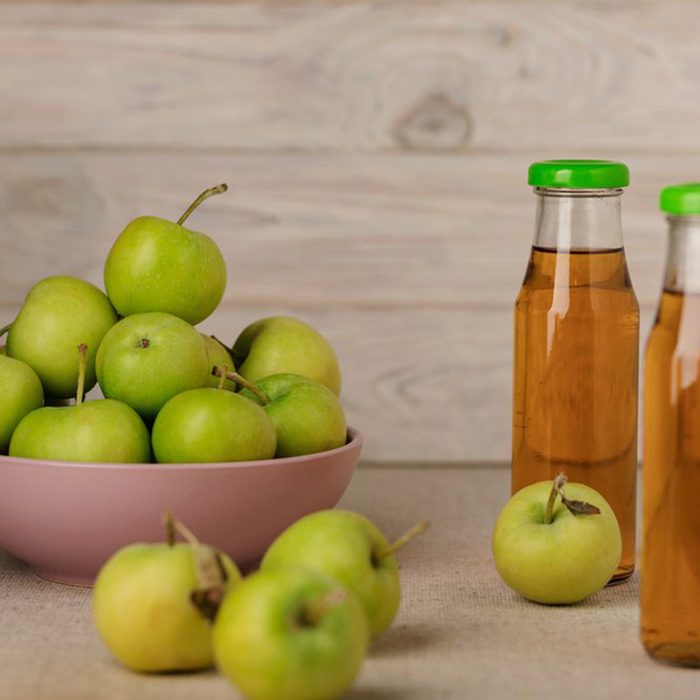
Drink it right after eating
If you’re in the habit of drinking apple cider vinegar after a meal, you might want to amend your routine. Taking apple cider vinegar on an empty stomach is actually the best way to maximize its health benefits. Drinking it before you eat also boosts its ability to help you process food. Experts recommend waiting about 20 minutes to eat something after you take ACV, to give the vinegar time to digest, or you could have it as part of your meal. Try these 48 delicious apple cider vinegar recipes to get you started.
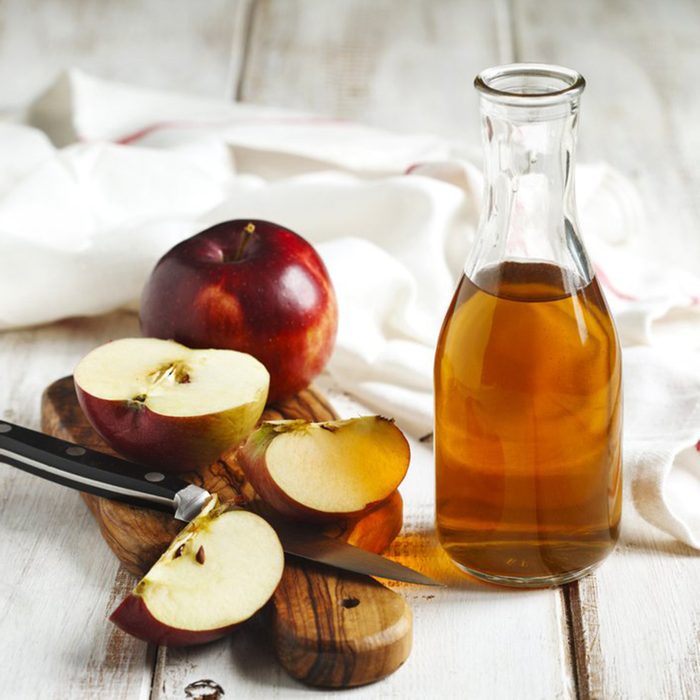
Breathe it in
Inhaling isn’t a good strategy for how to take apple cider vinegar. As good as apple cider vinegar can be for your digestive tract and heart, it can seriously harm your lungs. That’s why you should always be careful to keep from inhaling it when you drink it. This can cause a burning sensation in your lungs—stick to drinking it. This beverage is our recommended way to drink it.
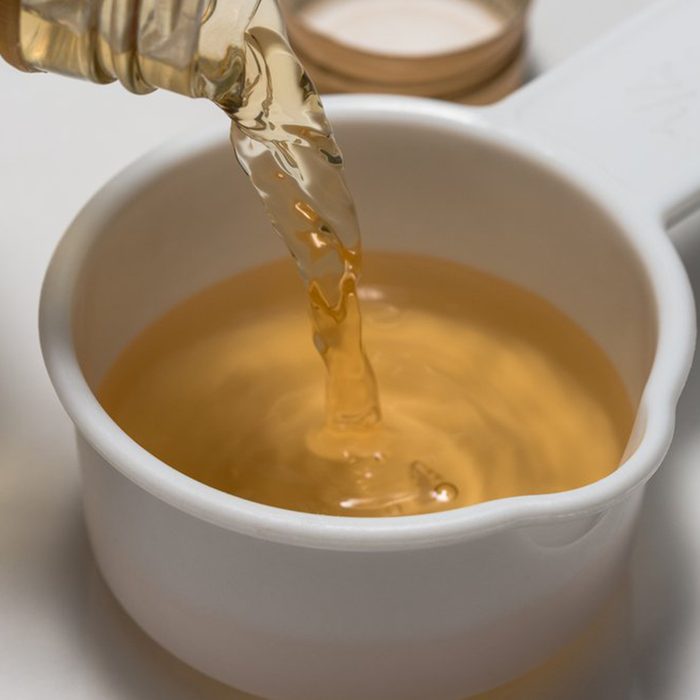
Take swigs of it
Even when it’s diluted, apple cider vinegar is still an extremely acidic substance. “Because of its highly acidic nature, ACV… can damage your tooth enamel,” says Caitlin Hoff, a health and safety investigator for Consumer Safety. To keep the vinegar from wearing on your tooth enamel, don’t just sip it or swig it from a glass (even diluted). Instead, try drinking it through a straw so that it comes into as little contact as possible with your choppers. Elizabeth Abel, MS, a licensed dietician, nutritionist and creator of freeandabel.com, also recommends avoiding brushing your teeth for at least 30 minutes after taking apple cider vinegar. Learn more about how apple cider vinegar affects your teeth.

Start by drinking lots of it
Too much of a good thing is usually a problem—and apple cider vinegar is no exception. “It’s a good idea to ease into it,” says Abel.”If it gives you an upset stomach or a burning feeling, reduce the amount until there’s no sensation,” Abel suggests. Even if all goes smoothly and you experience no issues, you should never go beyond two tablespoons at a time. “Even when you dilute it in water, limit your intake to two tablespoons to protect yourself against harmful or uncomfortable side effects,” Hoff advises.

Drink it right before bed
While taking apple cider vinegar before you eat is a good idea, taking it before you sleep is not. “Taking ACV immediately before bed is not advised because of the potential for it to creep back up the esophagus,” says Laura C. Stix, ND, a naturopathic doctor and clinical hypnotherapist. Even if the ACV is diluted, it can still harm your esophagus if the acid comes into contact with it while you’re lying down. “Regardless of the time of day, people should remain upright for 30 minutes after taking it to ensure there is no reflux and irritation to the esophagus,” Stix adds.
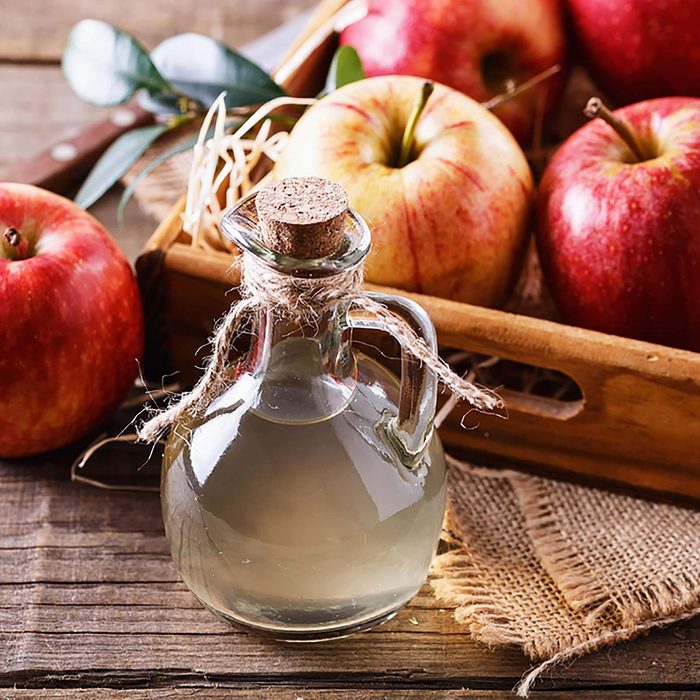
Take it if you have H. pylori
While apple cider vinegar can, for the most part, seriously boost your digestive health, there are some stomach conditions that this acidic substance will only make worse. For instance, if you have Helicobacter pylori—the bacteria linked to ulcers—apple cider vinegar (and the acid it contains) can cause even more irritation, warns Abel. If you have any doubts about drinking ACV—regardless of the reason—consult your doctor beforehand.
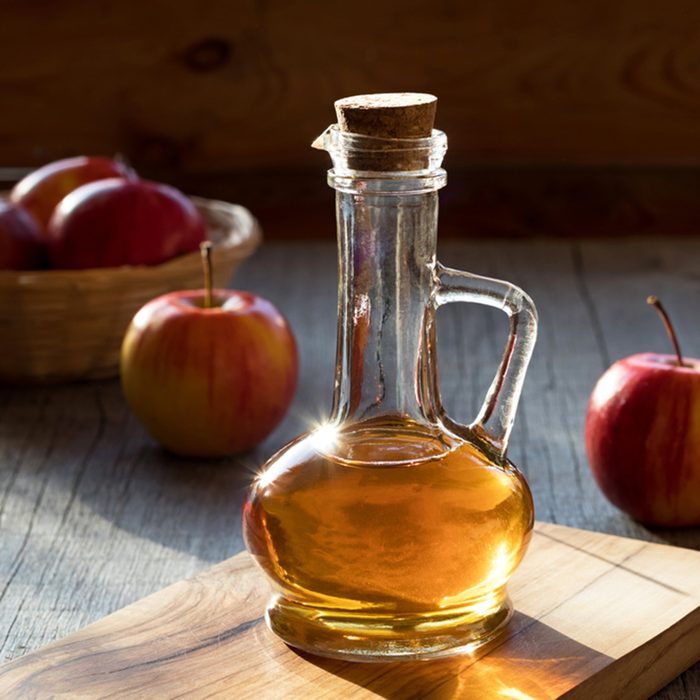
Put it directly on your skin
You can use this super-substance to banish acne and dandruff, ease sunburn and for all sorts of other beauty benefits. But there’s a right and a wrong way to use ACV on your skin, too. “Whether you’re using ACV as a toner, to remove blemishes or to treat infections, it’s crucial that you dilute it and minimize the contact with your skin,” says Caleb Backe, a health and wellness expert for Maple Holistics. “Prolonged exposure to the highly acidic vinegar can actually kill skin cells, erode your skin and even leave you with semi-permanent chemical burns.” Here’s how we like to use apple cider vinegar on our skin.
